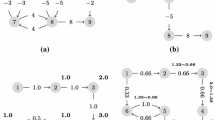Abstract
We propose a dead-end control algorithm for the exact solution of NP-hard combinatorial optimization problems. The efficiency of the algorithm is demonstrated by examples of solving the set-partition and 0-1 knapsack problems. The paper also shows that the use of the idea of dead-end controls when implementing the dynamic programming method can considerably reduce the number of problem state variables at each optimization step. A comparative analysis of the proposed method with known algorithms for solving these problems is carried out.

Similar content being viewed by others
REFERENCES
Bellman, R., Dynamic Programming, Princeton: Princeton Univ. Press, 1957. Translated under the title: Dinamicheskoe programmirovanie, Moscow: Izd. Inostr. Lit., 1960.
Cormen, T.H., Leiserson, C.E., Rivest, R.L., and Stein, C., Introduction to Algorithms, Cambridge MA: MIT Press, 2002. Translated under the title: Algoritmy: postroenie i analiz, Kiev: Williams, 2013.
Pisinger, D., A minimal algorithm for the 0-1 knapsack problem, Univ. Copenhagen. Oper. Res., 1997, vol. 46, no. 5, pp. 758–767.
Kellerer, H., Pferschy, U., and Pisinger, D., Knapsack Problems, Berlin: Springer Sci.+Bus. Media, 2010.
Korneenko, V.P., Metody optimizatsii (Optimization Methods), Moscow: Vyssh. Shkola, 2007.
Sigal, I.Kh. and Ivanova, A.P., Vvedenie v prikladnoe diskretnoe programmirovanie: modeli i vychislitel’nye algoritmy (Introduction to Applied Discrete Programming: Models and Computational Algorithms), Moscow: Fizmatlit, 2002.
Gafarov, E.R., Dolgui, A., Lazarev, A.A., et al., A new effective dynamic program for an investment optimization problem, Autom. Remote Control, 2016, vol. 77, no. 9, pp. 1633–1648. https://doi.org/10.1134/S0005117916090101
Lazarev, A.A., Graphic approach to combinatorial optimization, Autom. Remote Control, 2007, vol. 68, no. 4, pp. 583–592.
Lazarev, A.A., Teoriya raspisanii. Metody i algoritmy (Schedule Theory. Methods and Algorithms), Moscow: Inst. Probl. Upr. Ross. Akad. Nauk, 2019.
Bretthauer, K.M. and Shetty, B., The nonlinear knapsack problem—algorithms and applications, Eur. J. Oper. Res., 2002, vol. 138, no. 3, pp. 459–472.
Riedhammer, K., Gillick, D., Favre, B., and Hakkani-Tür, D.,Packing the meeting summarization knapsack, Proc. Interspeech, (Brisbane, Australia, 2008).
Robson, J.M., Finding a maximum independent set in time \(O(2n/4) \), Tech. Rep. 1251-01, LaBRI, Univ. Bordeaux I, 2001.
Yablonskii, S.V., Vvedenie v diskretnuyu matematiku (Introduction to Discrete Mathematics), Moscow: Nauka, 1986.
Korneenko, V.P., Nazyuta, S.V., and Chursin, A.A., System for uncertainty factors accounting when optimizing and choosing effective options for network work schedules on a dynamic model with dead-end controls, in IOP Conf. Ser.: Earth Environ. Sci. Proc. Int. Sci. Technol. Conf. Earth Sci., (Vladivostok, Russia, 2021), IOP Publ., 2021, Sci. 666 062129. https://doi.org/1088/1755-1315/666/6/062129
Papadimitriou, C.H. and Steiglitz, K., Combinatorial Optimization: Algorithms and Complexity, Englewood Cliffs, N.J.: Prentice-Hall, 1982. Translated under the title: Kombinatornaya optimizatsiya. Algoritmy i slozhnost’, Moscow: Mir, 1985.
Author information
Authors and Affiliations
Corresponding author
Additional information
Translated by V. Potapchouck
Rights and permissions
About this article
Cite this article
Korneenko, V.P. An Efficient Algorithm of Dead-End Controls for Solving Combinatorial Optimization Problems. Autom Remote Control 82, 1692–1705 (2021). https://doi.org/10.1134/S0005117921100076
Received:
Revised:
Accepted:
Published:
Issue Date:
DOI: https://doi.org/10.1134/S0005117921100076




